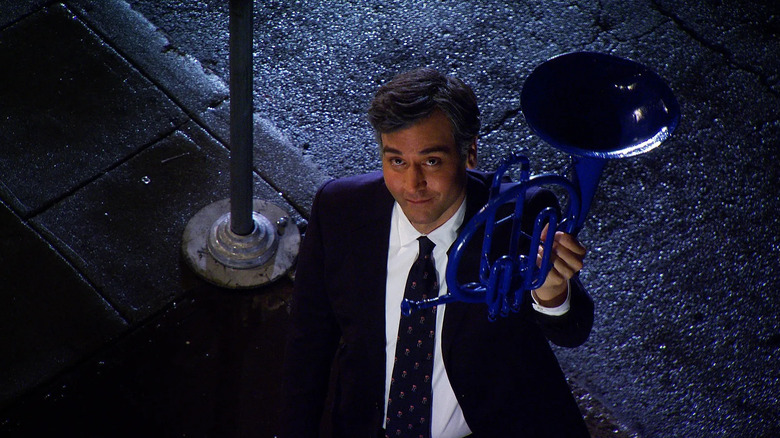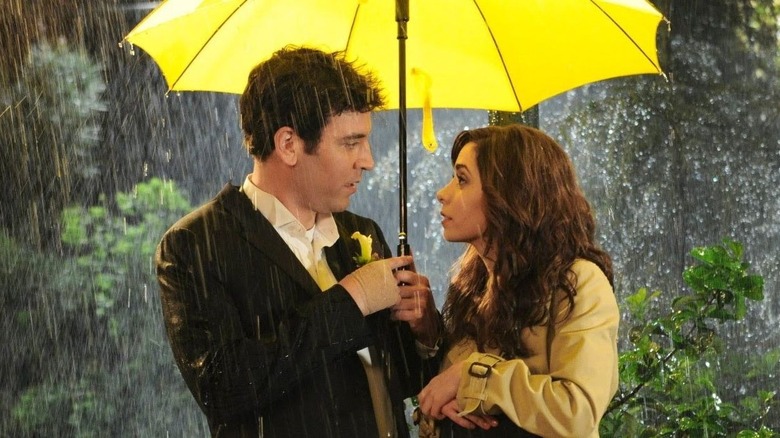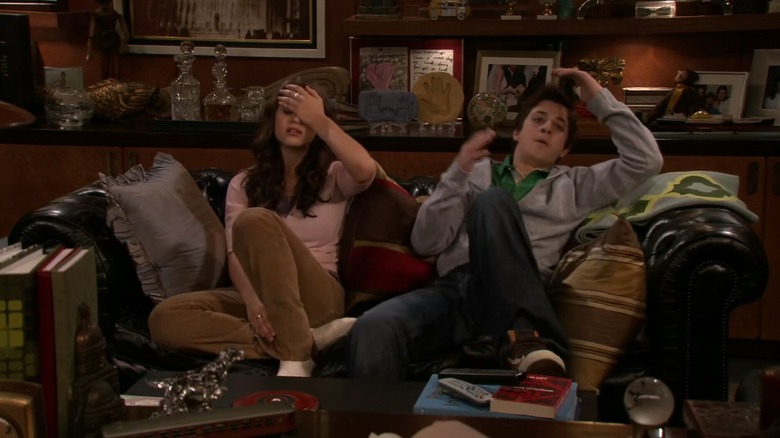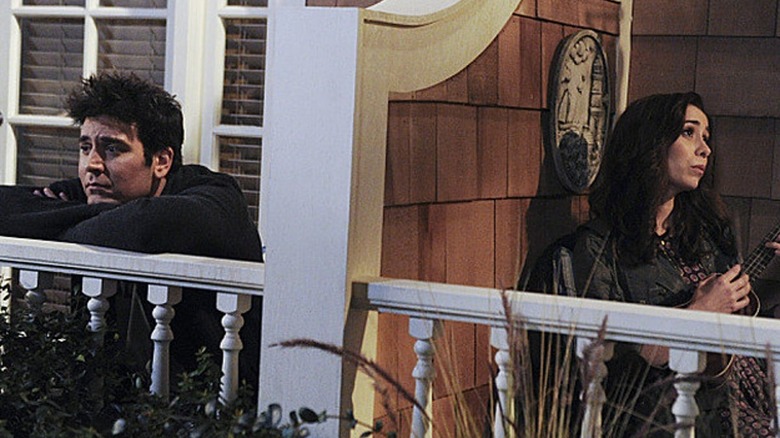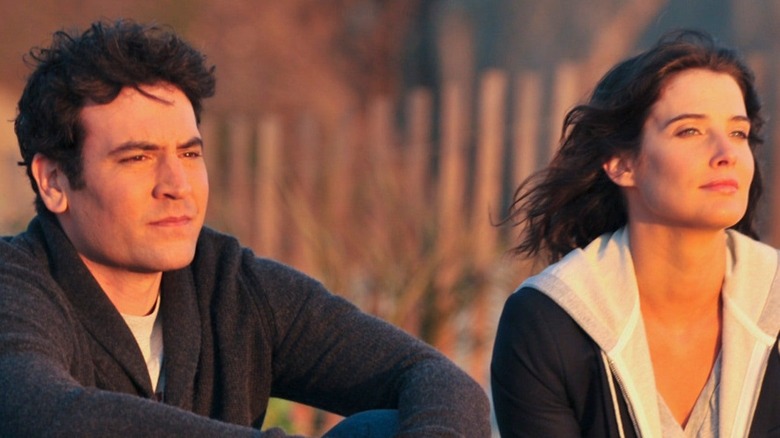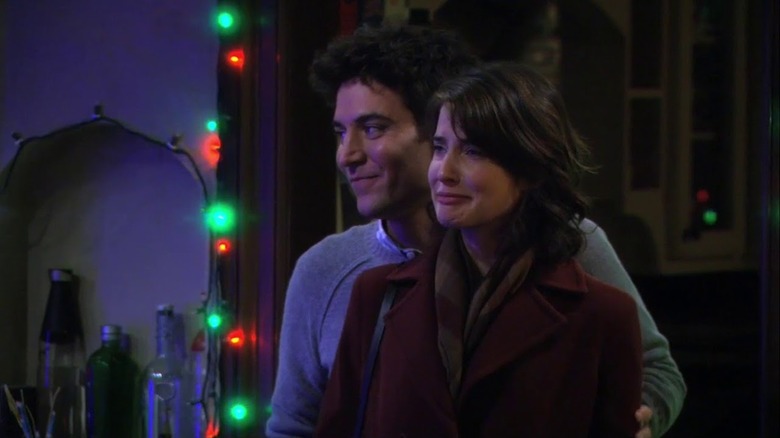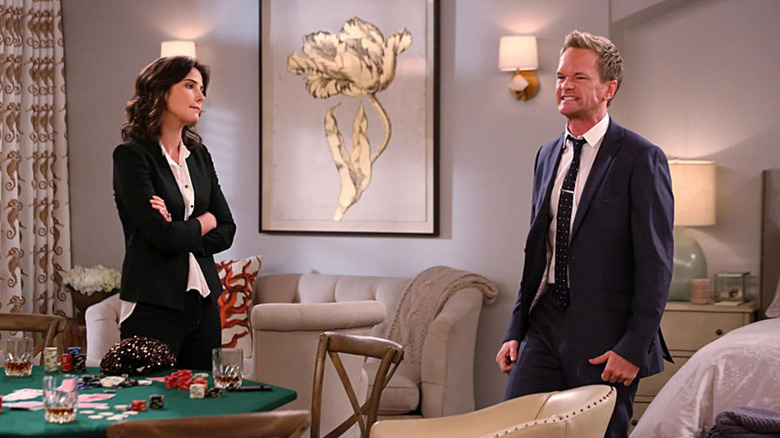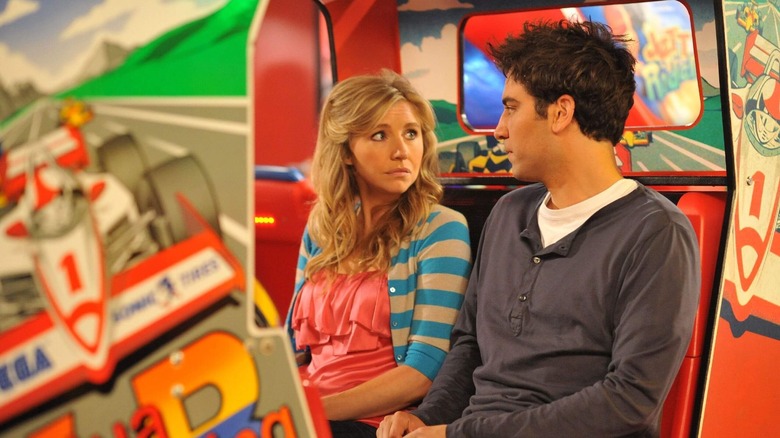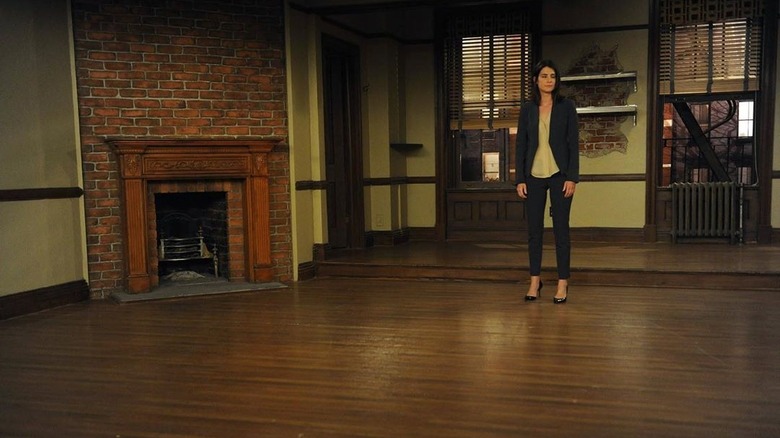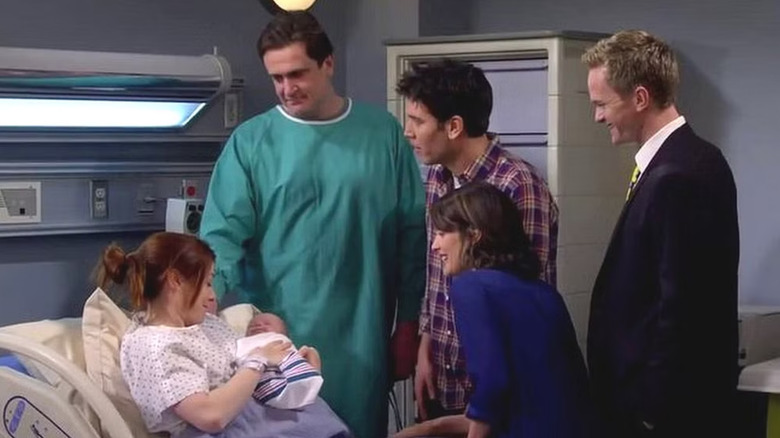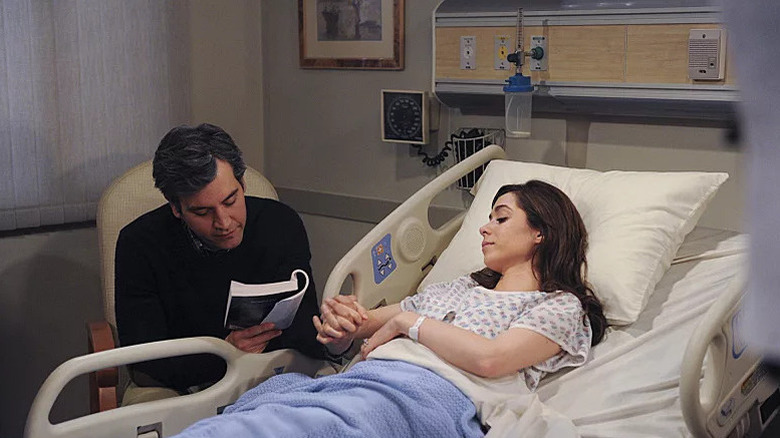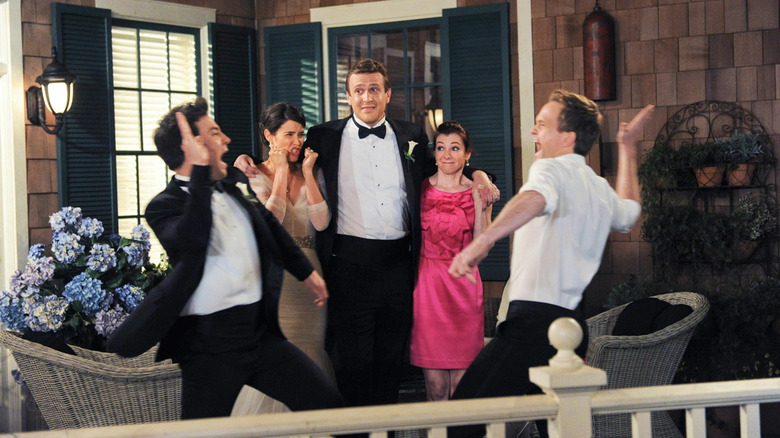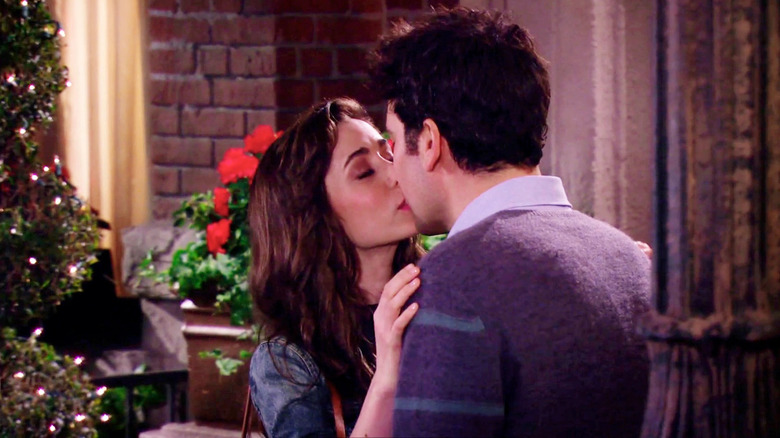How I Met Your Mother Ending Explained: We May Have Been Too Harsh
We may receive a commission on purchases made from links.
It's been over a decade since "How I Met Your Mother" ended, and people are still bitter about it. Widely considered "HIMYM's" worst episode, the finale is the lowest rated of the show on IMDb, at 5.5 out of 10. On the post-episode discussion boards, disgruntled fans took to jokingly renaming the show "How I Settled for Your Mother" or "How I Used Your Mother to Have the Kids Aunt Robin Could Never Have."
Whereas sitcoms from the same era like "The Office" and "Parks and Recreation" stayed popular and became even more culturally relevant in the years after they ended, "How I Met Your Mother" has largely faded into irrelevancy. The only regular reminder most people get of the show is that gif of Robin crying under her desk.
In fact, the ending to "HIMYM" was so widely disliked that it's nearly killed the whole subgenre of sitcoms that follow the dating lives of groups of friends living in New York City. Whereas "HIMYM" filled the hole left by the end of "Friends," there has been no rush to fill the void left by "HIMYM's" absence. Even its spinoff "How I Met Your Father" didn't come close to recapturing the original's popularity. The show's joined the ranks of "Game of Thrones" and "Lost" where the controversial ending has overshadowed everything that came before.
The case for why the How I Met Your Mother finale ended terribly
The basic argument for why the finale was bad was because it failed to live up to what the show seemed to be promising. We were told this was a story about Ted (Josh Radnor) meeting the love of his life, but his happily ever after had him going back to Robin (Cobie Smulders). We were told Barney (Neil Patrick Harris) and Robin were great for each other, centering the entire final season around the buildup to their wedding, only for them to get divorced and go their separate ways within a single episode. After several seasons of Barney realizing that his life of meaningless hookups wasn't fulfilling, watching him go straight back to that in the finale was just depressing to witness.
Although the ending twist was something planned from the very beginning (you can tell because the teen actors were the same age as they were in the early seasons), by the ninth season, the characters had evolved to the point where that ending no longer fit. Barney and Robin, most fans seemed to feel, had way more chemistry than Ted and Robin ever did, and Tracy's (Cristin Milioti) integration into the show in Season 9 was so successful that the idea of killing her off and bringing back Ted and Robin immediately afterward felt extra insulting. The show clarified that a socially appropriate amount of time had passed before Ted went back to Robin, but in the episode itself it's only a couple minutes of screen time. It feels like Ted got over her death callously fast, even though we technically know that's not true.
Despite all this, I'd argue that the ending was good actually, even considering how much the characters had evolved in the later seasons. Not only does it not deserve its place on every single "worst series finales of all time" list written since 2014, but it also worked as a good conclusion to the themes the show's been exploring throughout its run.
Rejecting the idea of 'the one'
There's a moment in the early Season 1 episode "Return of the Shirt" where Ted tries to explain why it wouldn't be bad to break up with a girl by telling her she just wasn't the one for him. "The chances of one person being another person's 'the one' are like six billion to one," he says. "You wouldn't take it personally if you lost the lottery." It's meant to be seen as bad reasoning, and when Ted does try to give this explanation to the girl he's breaking up with, she appropriately roundhouse kicks him out of his chair.
This idea of Ted finding "the one" is constantly explored throughout the nine seasons of "How I Met Your Mother," and it's always kind of ambiguous whether the show itself believes in the concept. When you express the idea in the way Ted phrased it, the idea that only one person in the world is your soulmate is inherently depressing. The odds of actually finding that one person on our planet of 7 billion people are slim to none, which means most people end up settling for someone they deem close enough.
A lot of the criticism of the finale, however, seems to take this idea of "the one" at face value, that because Ted ends up with Robin at the end, that must mean that Robin was "the one" and Tracy wasn't. A common interpretation of the finale is that it tells us Tracy was just a consolation prize Ted settled for because Robin was out of reach.
There is no 'the one'
The reason the "consolation prize" criticisms ring hollow to me is because the show itself spends a lot of time critiquing that very idea, most notably in "How the Mother Met Me." In one of the ninth season's most widely beloved episodes, the show follows Tracy's life from the same night Ted met Robin to the weekend of the wedding. Tracy's big problem, the big internal dilemma she needs to overcome, is that she believes she's already hit the romantic jackpot with her boyfriend Max, who died unexpectedly in the opening scene. She believes that everyone gets that one person they're meant to be with, and she's already lost that person.
As a result, she ends up losing interest in dating seriously, and when she does find herself a new long-term boyfriend, she's settling for someone she knows she'll never truly be in love with. She believes the feeling she had with Max is impossible to recapture, so this is the best she can hope for.
But as the episode does a pretty good job arguing: Tracy is wrong here. The idea that there's only one right person for you and that everyone afterward can never possibly measure up is an unhealthy mindset to have, and the episode ends with Tracy accepting this, finally bringing herself to be emotionally open enough for Ted to enter her life.
We didn't know it at the time, but this was a deliberate parallel to what Ted would have to go through after her death. I don't think anyone would watch this episode and come out of it thinking that Tracy's original idea about the importance of "the one" is a healthy or reasonable belief, so why apply that idea to Ted in the finale?
The return of Ted and Robin
The reason for that is understandable: Ted doesn't move on from Tracy to somebody completely new; he moves on to somebody he's already dated. Throughout the latter seasons of "How I Met Your Mother," Ted often struggled to let go of his feelings for Robin, which turned into a source of conflict at least once in every season after they break up. (The one exception is Season 6, where they'd managed to achieve a fairly comfortable, drama-free friendship.) It all seemingly culminated in the Season 9 episode "Sunrise" where Ted lets Robin go and, in a scene that doesn't really work but has a nice idea behind it, she floats away like a CGI balloon.
What's often lost in the criticism of the finale is the acknowledgement that Ted and Robin never stopped loving each other, nor was Ted's love for her ever presented as a character flaw. The problem was that their love was at odds with the type of life they wanted. Ted didn't just want kids, he was actively looking forward to having them. Robin didn't just not want kids, she was very clear that she intended to go her whole life without them, even before it turned out she couldn't get pregnant. The question of whether they loved each other or not was always yes; they just knew that this road led to a clear dead end. They made the mature, rational decision to break the relationship off, and the finale never tries to argues that this was the wrong choice.
Were Ted and Robin's character development really undermined in the end of How I Met Your Mother?
If you don't think Robin and Ted have as much chemistry as Barney and Robin, that can't be changed, but one of the biggest complaints about the finale's decision to have them end up together is that it supposedly undermined both character's arcs throughout the show. Post-breakup they both struggled hard to move on from each other, the argument goes, so having them go back to each other makes all the time we spent watching them struggle to move on pointless. Phrases like "they threw away years of character development!" were common back in 2014, and they're still popular today.
But the argument that these two returning to each other erases their character development is an argument that doesn't consider why that character development was necessary in the first place. By 2030 in the show's timeline, Ted has gotten the married-with-kids lifestyle he's always wanted, and Robin's gotten her chance to pursue her career and travel the world as much as she's always wanted. They had to move past each other because factors in their lives made that the only option, but now that those are out of the equation, what's stopping them?
The revelation in the finale that there's no longer anything preventing them from being a thing is a direct parallel to Season 6's "Oh Honey," where the Ted/Zoey relationship goes from seemingly impossible to suddenly making perfect sense with a single cut from Marshall's scissors. The finale doesn't erase their character development, it just recontextualizes it. They didn't need to let each other go because they weren't a good fit; they just weren't a good fit at that point in their lives.
If anything, the ending twist improves the later seasons, as it makes the constant flirtations with another Ted/Robin romance feel less like the show running in circles. Episodes like Season 7's "No Pressure," which ends with Marshall still believing Ted and Robin would end up together, plays a lot better when you know the show is in fact planning to follow through.
What How I Met Your Mother is trying to say with Barney and Robin
Although it probably wasn't the greatest idea in the world to have over 20 episodes dedicated to the weekend of Barney and Robin's wedding only to have them get divorced early in the next episode, one thing Season 9 does great on rewatch is planting the seeds that their marriage isn't going to last. Seriously, go back to Season 9 and count all the moments where Barney or Robin realize their relationship has serious flaws that need to be addressed, but the moment is promptly ignored after some grand romantic gesture from Barney makes things temporarily okay.
Season 9 hit audiences over the head with two major recurring themes: 1) Ted and Robin still have feelings for each other, and 2) the foundation of Barney and Robin's marriage isn't as strong as they'd like to think it is. It's interesting to compare the Season 9 wedding episode with Marshall and Lily's wedding in Season 2: there, even as one mishap happened after another, there was never any doubt whatsoever that Marshall or Lily would decide to go through with it.
But as much as the show hints that Barney and Robin wouldn't last, it never argues against the idea that their marriage was a waste of time. Early on in the finale, Barney describes getting the divorce by saying, "This isn't a failed marriage. It's a successful marriage that happened to only last three years." As YouTuber Julien Durand put it in his defense of the finale, this initially seems like a joke, but it's part of the core message of the show: just because a relationship ends, doesn't mean it was a mistake or a waste of time. Just because Tracy dies doesn't mean Ted wasted his time waiting for her, just like how Barney and Robin's divorce doesn't mean their love for each other was never real or worthwhile.
The journey, not the destination
This is a point the show's been arguing since day one, so it feels fitting they'd underline it in the finale. After all, 90% percent of what "How I Met Your Mother" does throughout its nine seasons is take us through the beginning, middle, and end of relationships we know are going to fail. We knew Victoria, Stella (Sarah Chalke) and Zoey were never going to be Ted's "the one," but the show still asks us to get invested in them and, if the ratings were any indication, audiences were more than happy to do so.
Even with the many love interests Robin and Barney meet, the show often makes it clear early on that it's not going to last. As much as "How I Met Your Mother" may have implied that answering the mystery of how Ted meets Tracy is the most important part, anyone watching the show weekly throughout the late 2000s/early 2010s would probably agree that the real magic of the show was how much it explored that confusing, chaotic period of life so many people go through. Even though Ted's goal is to start a family, these nine years of him being denied this goal are filled with some of the best moments of his life. Those relationships were not just things Ted had to get through in order to graduate to his relationship with Tracy; the show treats them as meaningful and worthwhile regardless of what came after.
The finale shows that life goes on
I'll admit I've always been kind of a fan of sad endings, and the finale of "How I Met Your Mother" really doesn't shy away from how sad it can be to slowly lose touch with a group of friends you used to be so close to. Not only that, but watching Barney go back to his womanizing ways after the divorce is legitimately one of the most depressing things I've ever seen in a sitcom. Barney's character arc in the finale is upsetting to watch and his devotion to his daughter doesn't do that much to lessen the sting, but upsetting isn't the same as badly written. His ending is very much in line with the Barney we've known throughout the show.
Critics also often pointed to the treatment of Robin in the finale as particularly disappointing. In a scathing critique for In These Times, culture critic Jude Doyle described Robin's post-marriage life like this: "Robin, sans boyfriend, is condemned to a sad life of bitter spinsterhood, distancing herself entirely from the core group of friends she once loved now that she's no longer dating Ted and/or Barney." But I don't think the finale actually paints Robin's life outside the group as tragic or bitter at all; it's just not completely devoid of sad moments in the way that happily-ever-after sitcom endings often imply.
It's often noted that as long as a TV show continues, the characters the show follows aren't allowed to be happy because then there'd be no story. At the end of "Friends," why do we assume Ross and Rachel aren't going to break up again a couple months down the line? It's not because they've meaningfully changed at all, but because we know the show no longer needs to milk their constant drama for narrative tension. As sad as the finale of "How I Met Your Mother" is, the series makes a clear, noble decision to contradict this entire idea, and show that the characters still deal with major problems even after the main story's ended.
The birth of Craig Thomas's son influenced the How I Met Your Mother ending
In a recent interview with People, co-showrunner Craig Thomas talked about how the birth of his son Elliot impacted the show. His son was born with a rare genetic disorder called Jacobsen syndrome, and that was an unexpected complication that changed the way Thomas viewed his life and his work. "This is while I'm about to go from the end of season 2 into running season 3 of 'How I Met Your Mother,' feeling so lost," Thomas said. "I felt I was living a drama while writing a comedy. And the truth is, they both go hand in hand. We did that on 'How I Met Your Mother.'"
He talked about how the later seasons of the show got a little more serious and dramatic, and how the lesson he learned from his son's condition is reflected in Ted's character journey. "Life doesn't always go the way you think it's going to go," he said. "And I think the show that was already kind of emotional was — it became more so."
It's easy to see what he means: Even before the finale, the later seasons of "HIMYM" were willing to go to some very dark places. Season 6 featured the major shock of Marshall's father dying. Season 7 has that tearjerker episode where Robin finds out she can never have kids. Every single character has to deal with some sort of major, identity-challenging complication in their life, and they all come out of it stronger for the experience. Ted in particular starts the show with a rigid idea of what a happy life for himself entails, and he finds freedom in his ability to slowly let those ideas go. As Thomas put it:
"I look back on it, and I look at the ending as an exploration of the fact that no matter how much Ted Mosby wanted to plan everything in life, it was never going to go according to plan. But if you go through life with an open heart, you can find a new plan in the end. And you can find love and be supported and lifted up at your lowest moments, even if things didn't go according to your plan that you made when you were young. And that there are other chapters that you can't see until you were in it, that's what that means to me."
One quick fix to the ending of How I Met Your Mother
Although I like the general way things played out in the end, I'll also admit that the ending twist could've been handled with a little more grace. The time between Tracy's death and the final scene where Ted shows up outside Robin's apartment is absurdly short, and it contributes to the feeling of Tracy being an afterthought.
My solution, if you were to give me a time machine and if the "HIMYM" writing room were for some reason willing to hear me out, would be to have the reveal that Tracy dies happen at least one episode prior to the finale. Maybe drop that bombshell at the end of the penultimate episode and give the audience a week before the finale to come to terms with it.
In general, Season 9 could've worked better if they'd played around with time more than they ended up doing. Imagine an alternate version of "The End of the Aisle" where the show jumped back and forth between Barney and Robin getting a divorce in the future and them getting married in the show's present; it would've helped to underline the themes that the finale and the rest of the show were interested in exploring. Instead, the final season saves all its big reveals for the very last episode, not allowing the characters much time to grapple with those changes on screen.
They mostly stuck to their conventional episodic sitcom structure throughout the season even as the ending they were planning would've benefitted from leaving that structure behind. It almost feels like the writers knew the two big plot points in the finale would anger viewers, so they postponed them for the last possible moment in a halfhearted attempt to avoid the backlash. As much as the finale's boldness got the show into trouble, ultimately the problem with the ending was that the whole final season wasn't bold enough.
What did the cast think of How I Met Your Mother's ending?
For the most part, the cast itself stands by the ending we got. Neil Patrick Harris confirmed in a Reddit AMA that he's a "fan of the finale," whereas Jason Segel told Stellar that he never got around to watching it. " Cobie Smulders has also defended the ending to Metro, saying, "When you go back to the very beginning of the show, it was Robin and Ted."
Speaking to the late, great Bob Saget, Josh Radnor attributed the anger over the finale to misplaced grief:
"They were sad it didn't end the way they wanted it to. Rather than sit with the feelings of sadness or loss—which is what [creators] Carter [Bays] and Craig [Thomas] were asking people to sit with... not everyone was up for that."
Alyson Hannigan has probably been the most vocally critical of the show, but despite how many disgruntled fans want to make it out like she despised it, her critiques are pretty mild. "I was bummed they didn't just make it a two-hour season-ender," she admitted (via News.com.au). Her main critique was that the audience didn't have enough time to process Tracy's death. She also believed Barney probably shouldn't have gotten married in the first place, saying, "I liked Barney and Robin. But in my heart, I always wanted her with Ted. I just feel they [Barney and Robin] shouldn't have gotten married."
Would the alternate ending of How I Met Your Mother worked better?
If you still don't like the finale, you can at least take solace in "How I Met Your Mother's" alternate ending that was released on the DVD box set. Robin and Barney still get divorced in this version of the finale, but Tracy survives and Ted and Robin don't reunite.
Here, the finale ends with Ted recounting all the big events that led to him meeting Tracy. We see him and Tracy have their meet-cute moment in the rain, followed by Ted telling his kids, "And that is how I met your mother." The end credits feature cute pictures from where all the characters were back in 2005, then some more sweet photographs of Ted and Tracy living happily ever after.
It's nice and all, nothing polarizing about it, but man is it boring. It's the show saying to its audience, "here's everything you expected the ending to be, exactly as you want it," like they're dutifully ticking off a checklist. It gives you nothing much to think about, it doesn't add much to anything that came before; it just gives you the inoffensive, warm fuzzy feelings that every other sitcom finale tries to do. It's not as divisive a finale, but it's a bland one.
The showrunners likely felt the same way, as they ended up running with the ending that stayed true to their vision for the show. "We only shot one script, but through edit room magic we had two possible outcomes for the series," co-creator Carter Bays said via EW. "We chose the ending we chose and we stand by it."
"How I Met Your Mother" is available for purchase on Prime Video.
